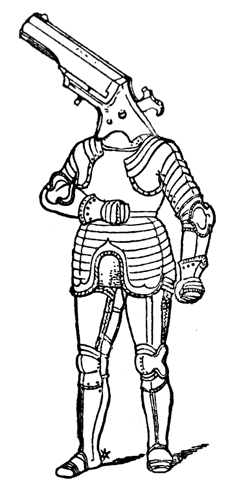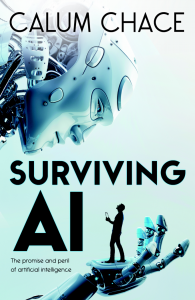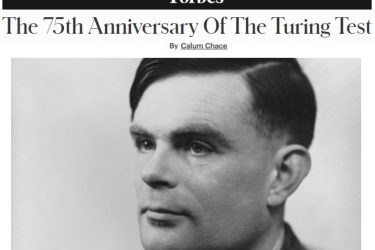Week two: the two Singularities
In the first third of his new book, Yuval Harari described how humanity escaped its perennial evils of famine, plague and war, and he claimed that we are now striving for immortality, happiness and divinity. Now he enters the territory of the economic and the technological singularities. Read on…
Free will is an illusion

Harari begins this section by attacking our strong intuitive belief that we are all unitary, self-directing persons, possessing free will. “To the best of our scientific understanding, determinism and randomness have divided the entire cake between them, leaving not even a crumb for ‘freedom’. … The notion that you have a single self … is just another liberal myth, debunked by the latest scientific research.” This dismissal of personal identity (the “narrating self”) as a convenient fiction will play an important role in the final third of the book, which we will get to next week.
A curious characteristic of “Homo Deus” is that Harari assumes there is no need to persuade his readers of the enormous impact that new technologies will have in the coming decades. Futurists like Ray Kurzweil, Nick Bostrom, Martin Ford and others (including me) spend considerable effort getting people to comprehend and take into account the astonishing power of exponential growth. Harari assumes everyone is already on board, which is surprising in such a mainstream book. I hope he is right, but I doubt it.
Stop worrying and learn to love the autonomous kill-bot

Harari is also quite happy to swim against the consensus when exploring the impact of these technologies. A lot of ink is currently being spilled in an attempt to halt the progress of autonomous weapons. Harari considers it a waste: “Suppose two drones fight each other in the air. One drone cannot fire a shot without first receiving the go-ahead from a human operator in some bunker. The other drone is fully autonomous. Which do you think will prevail? … Even if you care more about justice than victory, you should probably opt to replace your soldiers and pilots with autonomous robots and drones. Human soldiers murder, rape and pillage, and even when they try to behave themselves, they all too often kill civilians by mistake.”
The economic singularity and superfluous people
As well as dismissing attempts to forestall AI-enabled weaponry, Harari has no truck with the Reverse Luddite Fallacy, the idea that because automation has not caused lasting unemployment in the past it will not do so in the future. “Robots and computers … may soon outperform humans in most tasks. … Some economists predict that sooner or later, un-enhanced humans will be completely useless. … The most important question in twenty-first-century economics may well be what to do with all the superfluous people.”
My income is OK, but what am I for?
Harari has interesting things to say about some of the dangers of technological unemployment. He is sanguine about the ability of the post-jobs world to provide adequate incomes to the “superfluous people”, but like many other writers, he asks where we will find meaning in a post-jobs world. “The technological bonanza will probably make it feasible to feed and support the useless masses even without any effort on their side. But what will keep them occupied and content? People must do something, or they will go crazy. What will they do all day? One solution might be offered by drugs and computer games. … Yet such a development would deal a mortal blow to the liberal belief in the sacredness of human life and of human experiences.”
Personally, I think he has got this the wrong way round. Introducing Universal Basic Income (or some similar scheme to provide a good standard of living to the unemployable) will probably prove to be a significant challenge. Persuading the super-rich (whether they be humans or algorithms) to provide the rest of us with a comfortable income will, I hope, be possible, but it may have to be done globally and within a very short time-frame. If we do manage this transition smoothly, I suspect the great majority of people will quickly find worthwhile and enjoyable things to do with their new-found leisure. Rather like many pensioners do today, and aristocrats have done for centuries.
The Gods and the Useless

I have more common ground with Harari when he argues that inequality of wealth and income may become so severe that it leads to “speciation” – the division of the species into completely separate groups, whose vital interests may start to diverge. “As algorithms push humans out of the job market, wealth might become concentrated in the hands of the tiny elite that owns the all-powerful algorithms, creating unprecedented social inequality.”
Pursuing this idea, he coins the rather brutal phrase “the Gods and the Useless”. He points out that in the past, the products of technological advances have disseminated rapidly through economies and societies, but he thinks this may change. In the vital area of medical science, for instance, we are moving from an era when the goal was to bring as many people as possible up to a common standard of “normal health”, to a world in which the cognitive and physical performance of certain individuals may be raised to new and extraordinary heights. This could have dangerous consequences: when tribes of humans with different levels of capability have collided it has rarely gone well for the less powerful group.
The technological singularity

The technological singularity pops up briefly, and again Harari sees no need to expend much effort persuading his mainstream audience that this startling idea is plausible. “Some experts and thinkers, such as Nick Bostrom, warn that humankind is unlikely to suffer this degradation, because once artificial intelligence surpasses human intelligence, it might simply exterminate humankind.”



